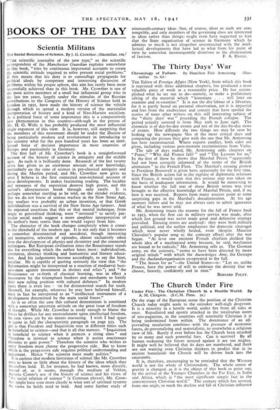The Thirty Days' War
Chronology of Failure. By Hamilton Fish Armstrong. (Mac- millan. 7$. 6d.) THE Editor of Foreign Affairs (New York), from which this book is reprinted with three additional chapters, has produced a most valuable piece of work at a reasonable price. He has accom- plished what he set out to do—namely, to make a preliminary sifting of the material which "historians . . . will later on examine and re-examine." It is not the dry labour of a librarian, for it is partly based on personal observation, yet it is impartial and free from the exuberance and conceit that have spoiled the stories of some other writers on this still interesting subject of the "thirty days' war" preceding the French collapse. The period actually covered is from May loth to June 24th. The chronicle is of day-by-day events and not of the day-by-day news of events. How different the two things are may be seen by looking up the newspaper files of the most critical days and comparing the picture they give with the one that Mr. Armstrong has here reconstructed. Where reports conflict, both sides are given, including various post-mortem recriminations from Vichy.
The tale of days ended, Mr. Armstrong adds chapters on "Peace," "Why did France fall?" and "The Lessons for us," In the first of these he shows that Marshal Petain "apparently had not been correctly informed of the terms of the British ultimatum" to the French Fleet. The Marshal's ensuing protest to President Roosevelt is given here, apparently for the first time. Since the British action led to the rupture of diplomatic relations with France, it would seem that this serious step was taken on the basis of inadequate information. It would be interesting to know whether the full text of these British terms was ever brought to the effective knowledge of Marshal Petain, and, if so, how it was received. Reports from many sources point to some surprising gaps in the Marshal's documentation. At his age memory falters and he may not always care to admit ignorance of what he was never told.
Mr. Armstrong traces the reasons for the fall of France back to 1923, when the first cut in military service was made, after which lost ground was never made good and defensive strategy prevailed. Ensuing errors are analysed : they were both military and political, and the author emphasises the domestic cleavages which were never wholly healed, even (despite Maurice Chevalier's popular song to the contrary effect) after the war began. "At least one eminent French chieftain disliked the whole idea of a mechanised army because, he said, mechanics are bound to be radicals," Mr. Armstrong tells us. The German army, on the contrary, "seems to have been directed by more original minds" with which the Auswartiges Amt, the Gestapo and the Auskmdsorganisation co-operated to the full.
"The lesson for us "—the United States—is : "Let us' unlike France, have the power of will to embrace the destiny that we choose, bravely, confidently and in time."
BERNARD FOLEY.


























 Previous page
Previous page